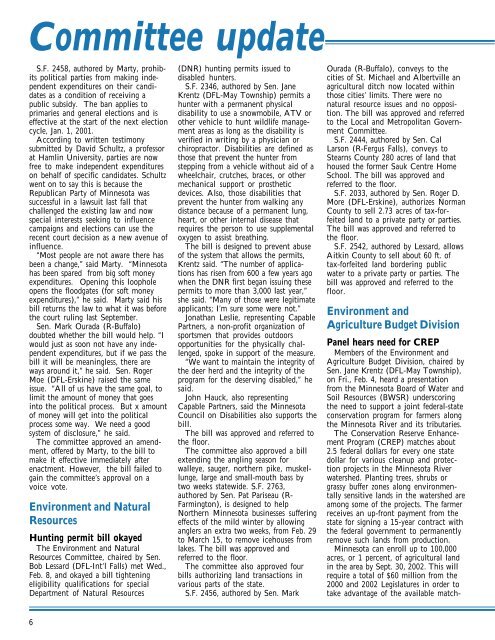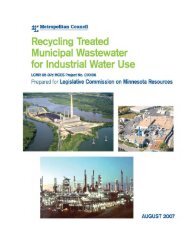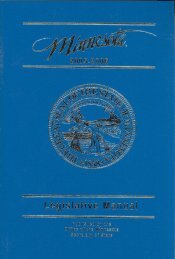Committee update - Minnesota State Legislature
Committee update - Minnesota State Legislature
Committee update - Minnesota State Legislature
Create successful ePaper yourself
Turn your PDF publications into a flip-book with our unique Google optimized e-Paper software.
<strong>Committee</strong> <strong>update</strong><br />
S.F. 2458, authored by Marty, prohibits<br />
political parties from making independent<br />
expenditures on their candidates<br />
as a condition of receiving a<br />
public subsidy. The ban applies to<br />
primaries and general elections and is<br />
effective at the start of the next election<br />
cycle, Jan. 1, 2001.<br />
According to written testimony<br />
submitted by David Schultz, a professor<br />
at Hamlin University, parties are now<br />
free to make independent expenditures<br />
on behalf of specific candidates. Schultz<br />
went on to say this is because the<br />
Republican Party of <strong>Minnesota</strong> was<br />
successful in a lawsuit last fall that<br />
challenged the existing law and now<br />
special interests seeking to influence<br />
campaigns and elections can use the<br />
recent court decision as a new avenue of<br />
influence.<br />
“Most people are not aware there has<br />
been a change,” said Marty. “<strong>Minnesota</strong><br />
has been spared from big soft money<br />
expenditures. Opening this loophole<br />
opens the floodgates (for soft money<br />
expenditures),” he said. Marty said his<br />
bill returns the law to what it was before<br />
the court ruling last September.<br />
Sen. Mark Ourada (R-Buffalo)<br />
doubted whether the bill would help. “I<br />
would just as soon not have any independent<br />
expenditures, but if we pass the<br />
bill it will be meaningless, there are<br />
ways around it,” he said. Sen. Roger<br />
Moe (DFL-Erskine) raised the same<br />
issue. “All of us have the same goal, to<br />
limit the amount of money that goes<br />
into the political process. But x amount<br />
of money will get into the political<br />
process some way. We need a good<br />
system of disclosure,” he said.<br />
The committee approved an amendment,<br />
offered by Marty, to the bill to<br />
make it effective immediately after<br />
enactment. However, the bill failed to<br />
gain the committee’s approval on a<br />
voice vote.<br />
Environment and Natural<br />
Resources<br />
Hunting permit bill okayed<br />
The Environment and Natural<br />
Resources <strong>Committee</strong>, chaired by Sen.<br />
Bob Lessard (DFL-Int’l Falls) met Wed.,<br />
Feb. 8, and okayed a bill tightening<br />
eligibility qualifications for special<br />
Department of Natural Resources<br />
6<br />
(DNR) hunting permits issued to<br />
disabled hunters.<br />
S.F. 2346, authored by Sen. Jane<br />
Krentz (DFL-May Township) permits a<br />
hunter with a permanent physical<br />
disability to use a snowmobile, ATV or<br />
other vehicle to hunt wildlife management<br />
areas as long as the disability is<br />
verified in writing by a physician or<br />
chiropractor. Disabilities are defined as<br />
those that prevent the hunter from<br />
stepping from a vehicle without aid of a<br />
wheelchair, crutches, braces, or other<br />
mechanical support or prosthetic<br />
devices. Also, those disabilities that<br />
prevent the hunter from walking any<br />
distance because of a permanent lung,<br />
heart, or other internal disease that<br />
requires the person to use supplemental<br />
oxygen to assist breathing.<br />
The bill is designed to prevent abuse<br />
of the system that allows the permits,<br />
Krentz said. “The number of applications<br />
has risen from 600 a few years ago<br />
when the DNR first began issuing these<br />
permits to more than 3,000 last year,”<br />
she said. “Many of those were legitimate<br />
applicants; I’m sure some were not.”<br />
Jonathan Leslie, representing Capable<br />
Partners, a non-profit organization of<br />
sportsmen that provides outdoors<br />
opportunities for the physically challenged,<br />
spoke in support of the measure.<br />
“We want to maintain the integrity of<br />
the deer herd and the integrity of the<br />
program for the deserving disabled,” he<br />
said.<br />
John Hauck, also representing<br />
Capable Partners, said the <strong>Minnesota</strong><br />
Council on Disabilities also supports the<br />
bill.<br />
The bill was approved and referred to<br />
the floor.<br />
The committee also approved a bill<br />
extending the angling season for<br />
walleye, sauger, northern pike, muskellunge,<br />
large and small-mouth bass by<br />
two weeks statewide. S.F. 2763,<br />
authored by Sen. Pat Pariseau (R-<br />
Farmington), is designed to help<br />
Northern <strong>Minnesota</strong> businesses suffering<br />
effects of the mild winter by allowing<br />
anglers an extra two weeks, from Feb. 29<br />
to March 15, to remove icehouses from<br />
lakes. The bill was approved and<br />
referred to the floor.<br />
The committee also approved four<br />
bills authorizing land transactions in<br />
various parts of the state.<br />
S.F. 2456, authored by Sen. Mark<br />
Ourada (R-Buffalo), conveys to the<br />
cities of St. Michael and Albertville an<br />
agricultural ditch now located within<br />
those cities’ limits. There were no<br />
natural resource issues and no opposition.<br />
The bill was approved and referred<br />
to the Local and Metropolitan Government<br />
<strong>Committee</strong>.<br />
S.F. 2444, authored by Sen. Cal<br />
Larson (R-Fergus Falls), conveys to<br />
Stearns County 280 acres of land that<br />
housed the former Sauk Centre Home<br />
School. The bill was approved and<br />
referred to the floor.<br />
S.F. 2033, authored by Sen. Roger D.<br />
More (DFL-Erskine), authorizes Norman<br />
County to sell 2.73 acres of tax-forfeited<br />
land to a private party or parties.<br />
The bill was approved and referred to<br />
the floor.<br />
S.F. 2542, authored by Lessard, allows<br />
Aitkin County to sell about 60 ft. of<br />
tax-forfeited land bordering public<br />
water to a private party or parties. The<br />
bill was approved and referred to the<br />
floor.<br />
Environment and<br />
Agriculture Budget Division<br />
Panel hears need for CREP<br />
Members of the Environment and<br />
Agriculture Budget Division, chaired by<br />
Sen. Jane Krentz (DFL-May Township),<br />
on Fri., Feb. 4, heard a presentation<br />
from the <strong>Minnesota</strong> Board of Water and<br />
Soil Resources (BWSR) underscoring<br />
the need to support a joint federal-state<br />
conservation program for farmers along<br />
the <strong>Minnesota</strong> River and its tributaries.<br />
The Conservation Reserve Enhancement<br />
Program (CREP) matches about<br />
2.5 federal dollars for every one state<br />
dollar for various cleanup and protection<br />
projects in the <strong>Minnesota</strong> River<br />
watershed. Planting trees, shrubs or<br />
grassy buffer zones along environmentally<br />
sensitive lands in the watershed are<br />
among some of the projects. The farmer<br />
receives an up-front payment from the<br />
state for signing a 15-year contract with<br />
the federal government to permanently<br />
remove such lands from production.<br />
<strong>Minnesota</strong> can enroll up to 100,000<br />
acres, or 1 percent, of agricultural land<br />
in the area by Sept. 30, 2002. This will<br />
require a total of $60 million from the<br />
2000 and 2002 <strong>Legislature</strong>s in order to<br />
take advantage of the available match-
















